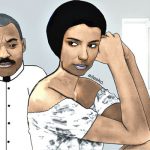General Bamaiyi’s book, ‘Vindication of a General’ ordinarily should not deserve a response. For one, Bamaiyi successfully portrayed himself in the book as self-opinionated and a bundle of contradictions. Or how else can one describe someone who claimed every other person he ever associated with or serve under as evil?
Before I am accused of exaggeration, let me give examples. In the book, he described his immediate elder brother, late Major-General Musa Bamaiyi, as callous, mischievous and dishonest (page 213-216); the Emir of his town, (Zuru,) General Sani Sami (retd), as an ingrate and an insincere Emir (page 185); General M. Gausau (his former GOC) as incompetent (page 38); General A. Z. Kazir, (his former Chief of Army Staff) an officer of doubtful loyalty (page 40); General M.C. Alli (his former Chief of Army Staff), a coward (page 45-46); Professor Yemi Osinbajo (present Vice President) as an indecisive and diabolical Attorney General (page 133); and General Abdulsalam Abubakar (former Head of State of Nigeria), an ex-convict (page 113).
Bamaiyi did not even spare General Sani Abacha from his self-conceited attacks, in spite of his pretentions. He opined: “I considered the Abacha project of transmuting into a civilian president as comparable to the futility of an individual who chooses to stand on the path of a train that has a failed brake. It becomes a useless display of bravery because that will not stop the train from crashing him and yet you are going to be killed.(page 237). “This is against the background of Bamaiyi’s bigotry in the same book where he proclaimed himself to be ‘too honest and too smart’ (page 12). A claim which General Ishola Williams has never made, even when he could justifiably do so.
However, on reflection, Chinua Achebe’s insightful opinion that: ‘An absence of objectivity and intellectual rigour at the critical moment of a nation’s formation is more than an academic matter. It inclines the fledging state to disorderly growth and mental deficiency,” compelled one to respond to history’s revisionism orchestrated by Bamaiyi’s desire to rehabilitate himself from historical oblivion engendered by his self- inflicted habitual treachery and deceits.
Suffice it to say, the book is a study in contradictions and incoherent thoughts. Bamaiyi posited that there is nothing phantom about the 1995 and 1997 coups. This conclusion is understandable from Bamaiyi’s perspective. He claimed to have detected and foiled the coups. This suggests outrightly that it will be self-contradictory for him to admit that the coups were phantom. Yet, Bamaiyi provided evidences throughout the book that the coups were indeed phantom. On 1995 coup, he claimed: “….I had doubt about General Obasanjo’s involvement in the coup based on the briefing we received from the DMI, Colonel Sabo, the SPI report, and the statements of other coupists” (page 41). What is more, the principal motive that led to set-ups to eliminate key political and military leaders was provided by Bamaiyi. Let me quote him again “…based on available evidence and body language of Gen. Sani Abacha himself, the goal of the transition programme was to return himself to power at the end (page 72)…the flaw in the transition programme changed the character of the regime entirely…it was an agenda that enjoyed the support of many members of his inner circle who capitalised on the weakness of General Sani Abacha. (page 73).
The perfidy of Bamaiyi was epitomised by his poor and failed attempt to exonerate himself from the 1997 coup set up against General Oladipo Diya. In the first instance, he admitted inadvertently that there were attempts to set up General Diya before 1997. Let me quote him: “Alli appeared to have agreed to help set up Diya but later confessed to such a setup …” (page 56). Again, he asked a rhetoric question, which succinctly suggested a set up against Diya. Let us hear him. “If we had tried to set up General Diya in 1996, why did he agree to deal with us again in 1997?” (Pp 56-57). In another instance, he said: Brig.Gen. Sabo, the DMI, once wrote a report to General Abacha alleging that General Babangida, Dr Mike Adenuga and I had been seen on Kaduna Road discussing how to overthrow Abacha.(p57)… I asked General Abacha to look at the report properly and see if General Babangida was accused of any offence or involvement in any anti-government activity. If there were nothing, what would he tell Nigerians after Babangida’s arrest? I told him to be careful about what his security operatives told him and the advice he took from them “(page 57). He further admitted that Abacha cohort manufactured evidences to get rid of their enemies.(pp95-96). It is therefore obvious from Bamaiyi’s narratives that General Oladipo Diya was apparently a victim of the ‘Abacha for life cohort’.
Bamaiyi rendition on the 1997 coup was riddled with incoherent thoughts and contradictions. In one breath, he argued that General Diya began the coup plan in 1994 which he, Bamaiyi, informed General Abacha (page 43-44). Yet, he reported that Gen. M C Alli was retired for plotting against Gen Abacha and the same Abacha prevented the retirement of Gen Diya on several occasions (page 43). Haba! You are not talking to fools.
The historical facts of the 1997 phantom coup are in the public domain. Nigerians do not need a Bamaiyi revisionism to form opinion on who concocted the coup. The chief investigator of the saga, Colonel Frank Omenka, authoritatively said: “When I hear people talk of Diya’s coup, I laugh because I know the truth; it was not, pure and simple. (Tell Magazine no 2, January 11, 1999 p17) Even Gen. Victor Malu judgement admitted that Gen. Diya was not the planner of the plot. Gen Malu said: “It was not necessary to inquire into who initiated the conspiracy. The tribunal is satisfied that nobody was arranged on the charge of initiating a coup plot and, as such, it was not necessary to inquire into who initiated the conspiracy._
If the truth must be told, Bamaiyi thrives on Niccolo Machiavelli’s adopted philosophy that ‘gratitude is a burden and revenge is a pleasure’ (Tacitus c.55-120A.D.) Bamaiyi tirade against Gen Diya apparently is informed by the historic speech of Gen Diya during his travails when he said: “Where is Bamayi? I am surprised that the Chief of Army Staff is not here. He is the mastermind, the executioner and the planner of this incident. I am not going into details of that now because this is a clear case of set up. I am the target and it is organised right from the top. It was a speech made literally at the point of death. It was a peech which not only exposed the diabolical intentions of General Abacha cohort but more importantly exposed Bamaiyi real character deficiency.
The truth is sacrosanct. No matter how many times a lie is told repeatedly, it is still a lie. For the General Bamaiyis of this world, there is a lot of wisdom in Calvin Coolidge’s (30th President of USA (1923-1929)) words, on why he spoke very little; “ if you don’t say anything you won’t be asked to repeat it”. A word is enough for the wise.
Oluranti Afowowe rantiafowowe@gmail.com






